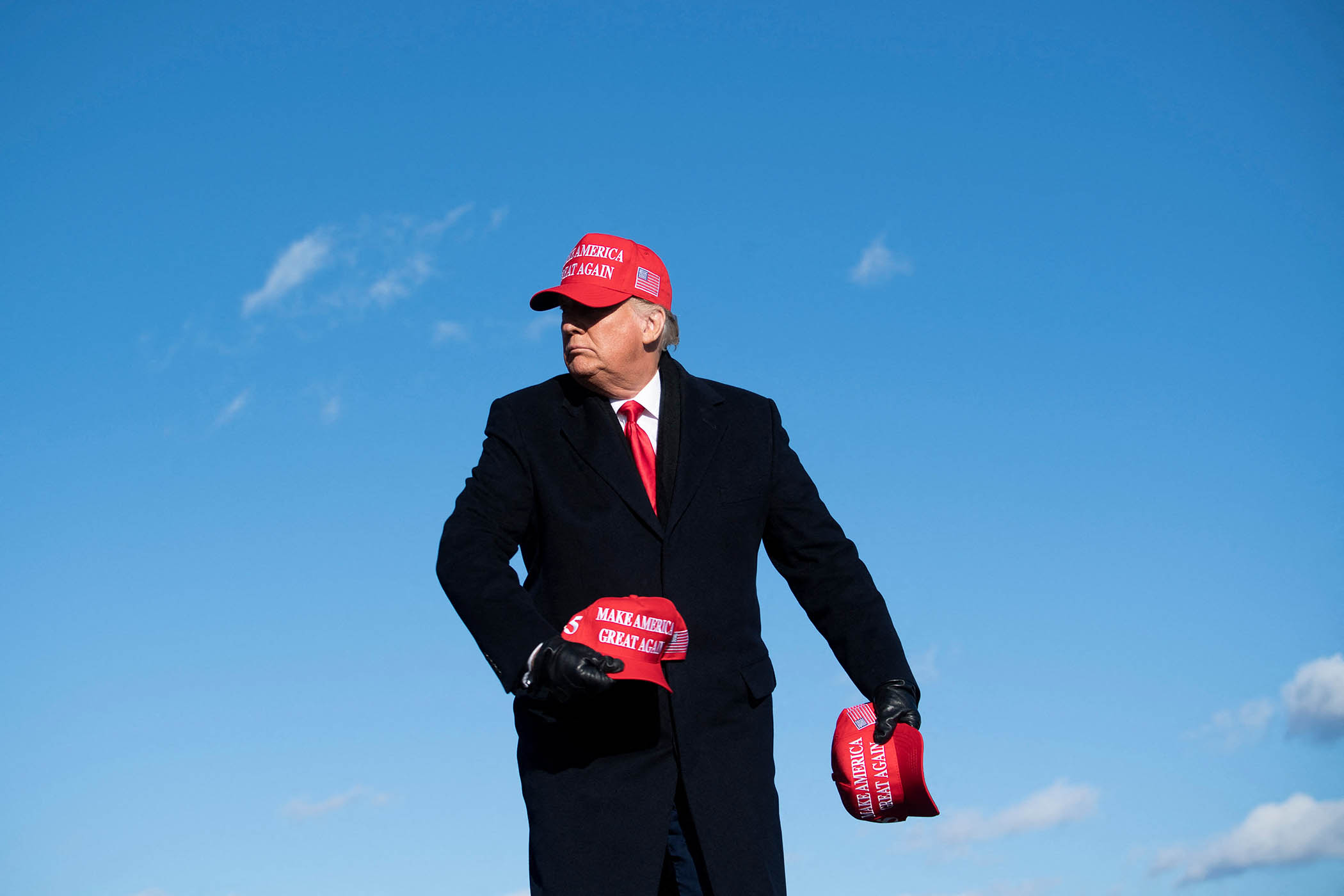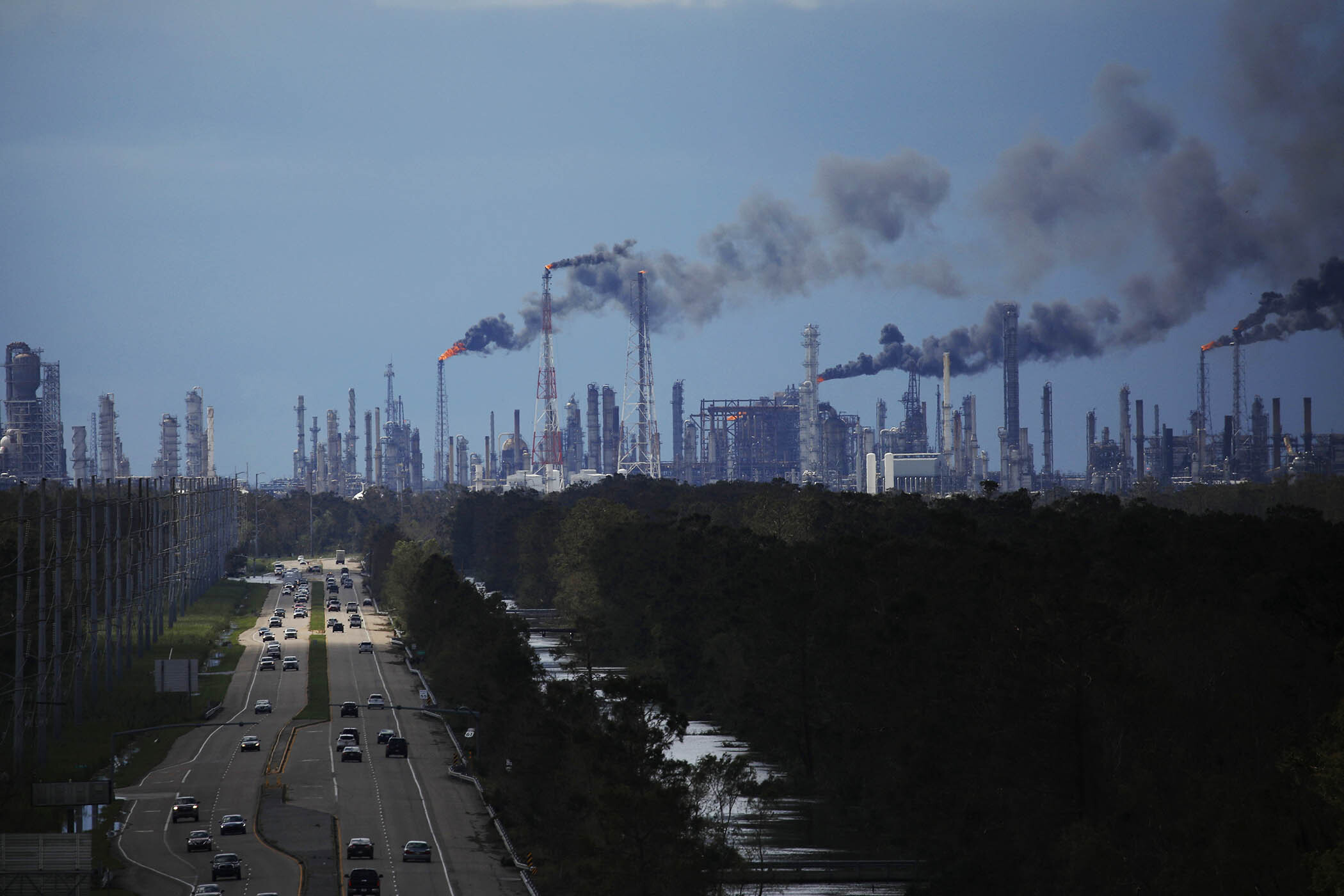On 27 August, Donald Trump gathered a group of senior advisers in the Oval Office to discuss the escalating crisis in Gaza. Alongside Steve Witkoff, the US special envoy to the Middle East, and Jared Kushner, the president’s son-in-law, sat a former UK prime minister, Tony Blair. The three men explained to Trump that there would never be peace in the region without a fair settlement in Gaza. They flattered him that his relationship with the Israelis and Arab states made him uniquely placed to strike a deal.
Trump was interested. As they set out their “comprehensive plan” for the post-conflict reconstruction of Gaza, he listened intently. Insiders say this was the critical meeting at which the president abandoned his scheme to relocate the Palestinians to other countries and turn Gaza into an American-run “Riviera of the Middle East”. Instead, he agreed that the US should push for Gaza to be rebuilt for the Gazans as part of a wider deal in the region. His resolve was only strengthened two weeks later when Israel bombed Qatar, a key US ally.
As ever, Trump was motivated more by self-interest than altruism. One person who knows the president well says: “He’ll do anything if he thinks it will get him the Nobel Peace prize.” Another describes his foreign policy as “why don’t we all make peace so we can all make money?”
Now, though, almost two years since the 7 October attacks on Israel, the diplomatic wheels are spinning. Four days after Trump published his 20-point plan for peace in Gaza, Hamas announced it would release the Israeli hostages. The statement issued on Friday night was only a partial acceptance of the terms set out in the plan but Trump decided to accept it and demanded that Israel must “immediately” stop the bombing.
There is much that could go wrong, and many flaws in the plan. Israeli airstrikes continued yesterday but hopes have risen that an end to the war might be in sight. One senior Labour figure thinks Trump has turned his unpredictability into a remarkably effective “diplomatic weapon”.
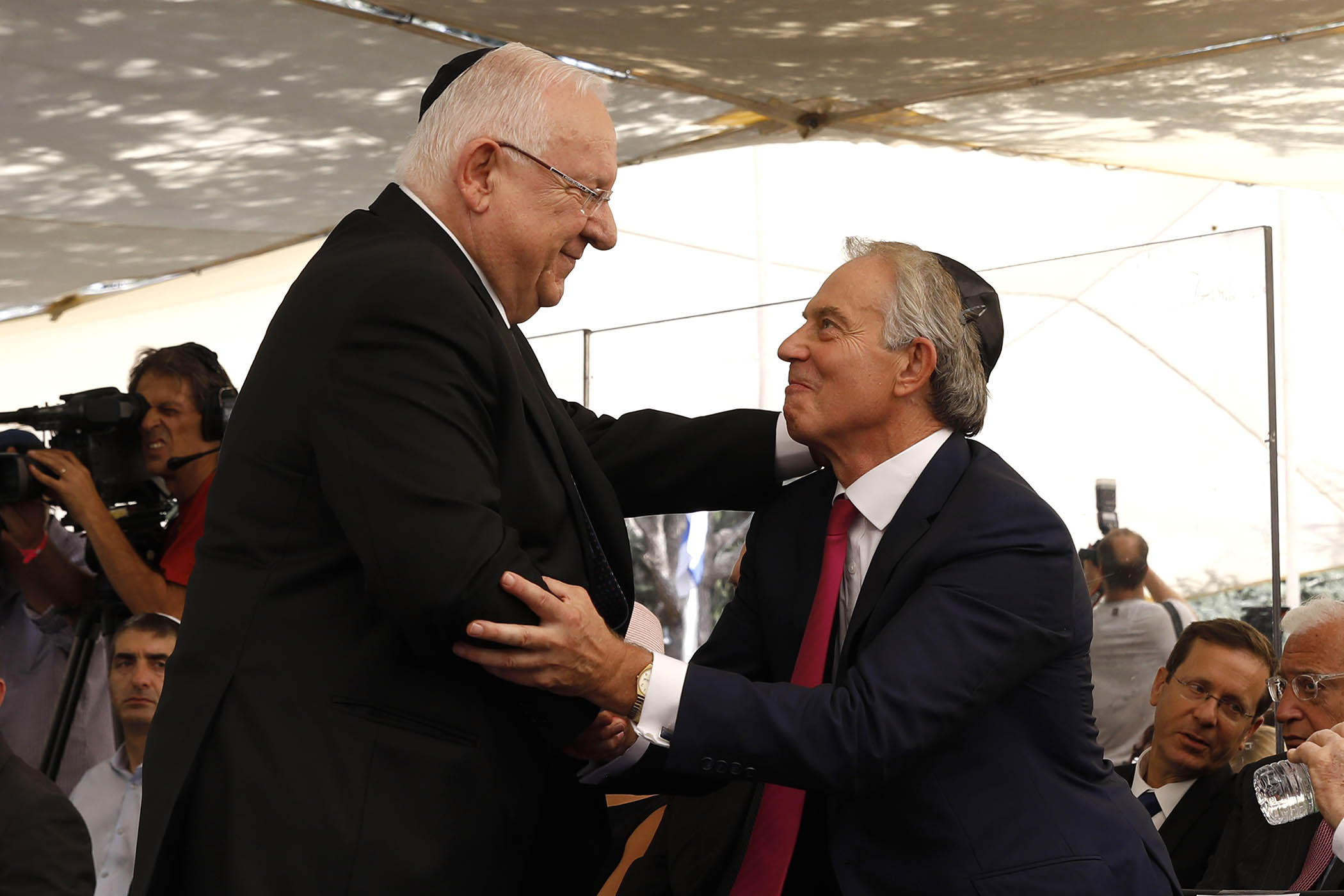
Israeli President Reuven Rivlin greets Blair in Jerusalem, 2017
If the presidential plan does go ahead, Blair will play a central role as the first named member of a new international “Board of Peace”. He has no intention of being a “name on the door”, detached from the reality on the ground. He would base himself in the region, at least initially, and be hands-on in securing funding for the reconstruction of Gaza and ensuring that money is properly accounted for and wisely spent. Already, the Tony Blair Institute has almost 100 staff working across the Middle East. The aim is for the people doing the day-to-day governing of Gaza to be Palestinians through a technocratic, apolitical committee.
The White House statement set out ambitions to “rebuild and energize” Gaza, drawing on the financial resources in the region and convening experts “who have helped birth some of the thriving modern miracle cities in the Middle East”. The language is that of a real estate developer; Blair has relationships with investors in the Arab world and beyond. There are likely to be contributions from governments in EU countries and Norway as well as the US, Saudi Arabia, the United Arab Emirates (UAE) and Qatar.
Eighteen years after leaving Downing Street, Blair still has powerful contacts in the region – including Mohammed bin Salman of Saudi Arabia, Mohammed bin Zayed of the United Arab Emirates (UAE) and King Abdullah of Jordan. He has known Benjamin Netanyahu since the 1990s when they were both leaders and is close to Kushner. They met on the Manhattan party circuit almost two decades ago and reconnected in 2010 at the christening of Rupert Murdoch and Wendi Deng’s daughters, Grace and Chloe. Their relationship deepened as Trump took power in 2016 and made Kushner a senior adviser, with wide-ranging responsibilities including the Middle East.
Interviewing Blair on stage at a conference in 2019, Kushner described the former prime minister as “a good friend to me and a good adviser on a lot of these issues”. The following year, Blair helped Kushner bring the UAE on board in his drive for Arab nations to normalise relations with Israel, known as the Abraham Accords.
The involvement of Blair in the new international board is controversial, particularly among Palestinians. Although as prime minister he helped negotiate peace in Northern Ireland, his reputation to many people was forever destroyed by his role in the 2003 war against Saddam Hussein. Sir Simon Fraser, former head of the Foreign Office, believes Blair is trusted in Washington, Israel and the Gulf “but the Arab street has not forgotten Iraq”.
Newsletters
Choose the newsletters you want to receive
View more
For information about how The Observer protects your data, read our Privacy Policy
For others, the idea of “Tony of Arabia” jetting in to save the Middle East is a throwback to colonial times. Daniel Levy, president of the US/Middle East Project, – whose father Michael was Blair’s Middle East envoy – thinks the Trump plan is fundamentally flawed. “It’s a charter for a new Dutch East India Company in the 21st century. When Palestinians are not in any way managing their own affairs, in what universe is that going to play well?”
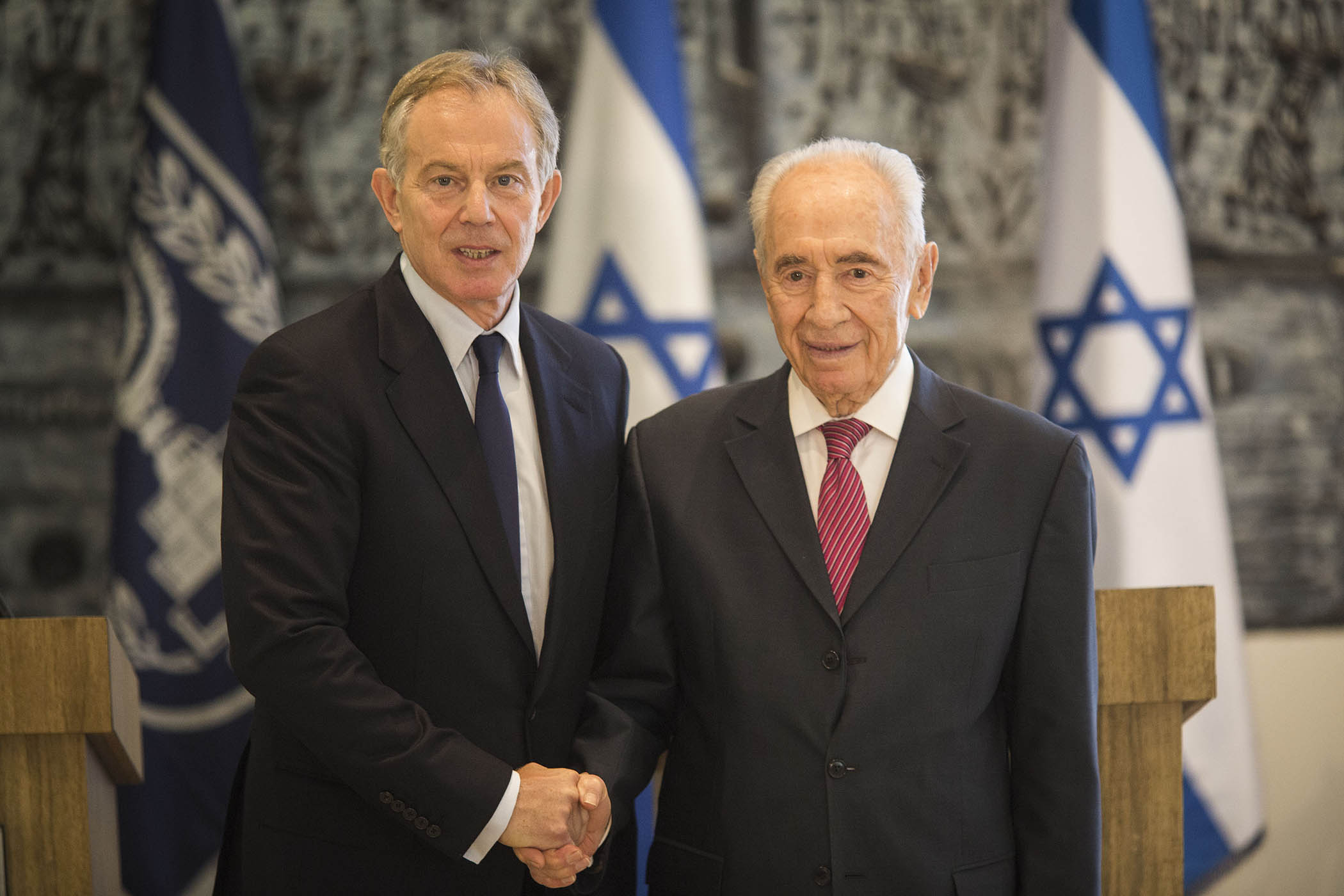
With former Israeli president Shimon Peres in Jerusalem, 2014
Salman Shaikh, ex-special assistant to the UN Middle East envoy, says Blair is “trusted by certain elites but … there has to be much more Palestinian agency, it has to be fairer and more balanced, which it doesn’t look like when you have Tony Blair.”
Others are more positive about his involvement. Lord Ricketts, head of the Foreign Office under Blair, thinks the former Labour leader has been a “good influence” on Trump in keeping alive the prospect of a two-state solution. “He was probably the last British prime minister who took a sustained interest in Arab-Israeli peace. Everybody else has regarded it as being in the too difficult tray,” he says. “Of course, Iraq is the albatross around his neck. But Blair has learned from the mistakes in Iraq, so when it comes to another chance to work on a post conflict transition, he brings that precious experience.”
He points out that on the day Blair left Downing Street in 2007, he immediately took up a role as Middle East peace envoy for the Quartet, made up of the UN, the US, the EU and Russia. “Most people when they step down as prime minister want a break but Blair stepped into active shuttle diplomacy,” Ricketts says. “I think he genuinely believes he’s got the negotiator skills to try to find a way through. There’s nobody around Witkoff that I can see who really knows anything about the Middle East. Blair, with his seniority, his authority, his contacts on all sides and his energy level I suspect will turn out to be a very significant player. If anyone is going to put real effort and air miles into making this work, it will be Blair.”
When Blair was first appointed envoy, the White House cautioned that the former prime minister was not “Superman” and he “doesn’t have a cape”. He installed himself in Jerusalem’s luxurious American Colony Hotel, taking over an entire floor, but his efforts to bring about peace were thwarted by elements of the US administration, and the role ended up being largely limited to economic development. For Blair, one of the few western political leaders who does “do God”, the real struggle was always a far more existential battle between Islam and Islamism, between religious tolerance and ideological extremism.
Now he is hoping that his relationship with Kushner will ensure he maintains the ear of Trump. Alistair Burt, the former Conservative minister for the Middle East, says criticisms of Blair for getting involved with them are misguided.
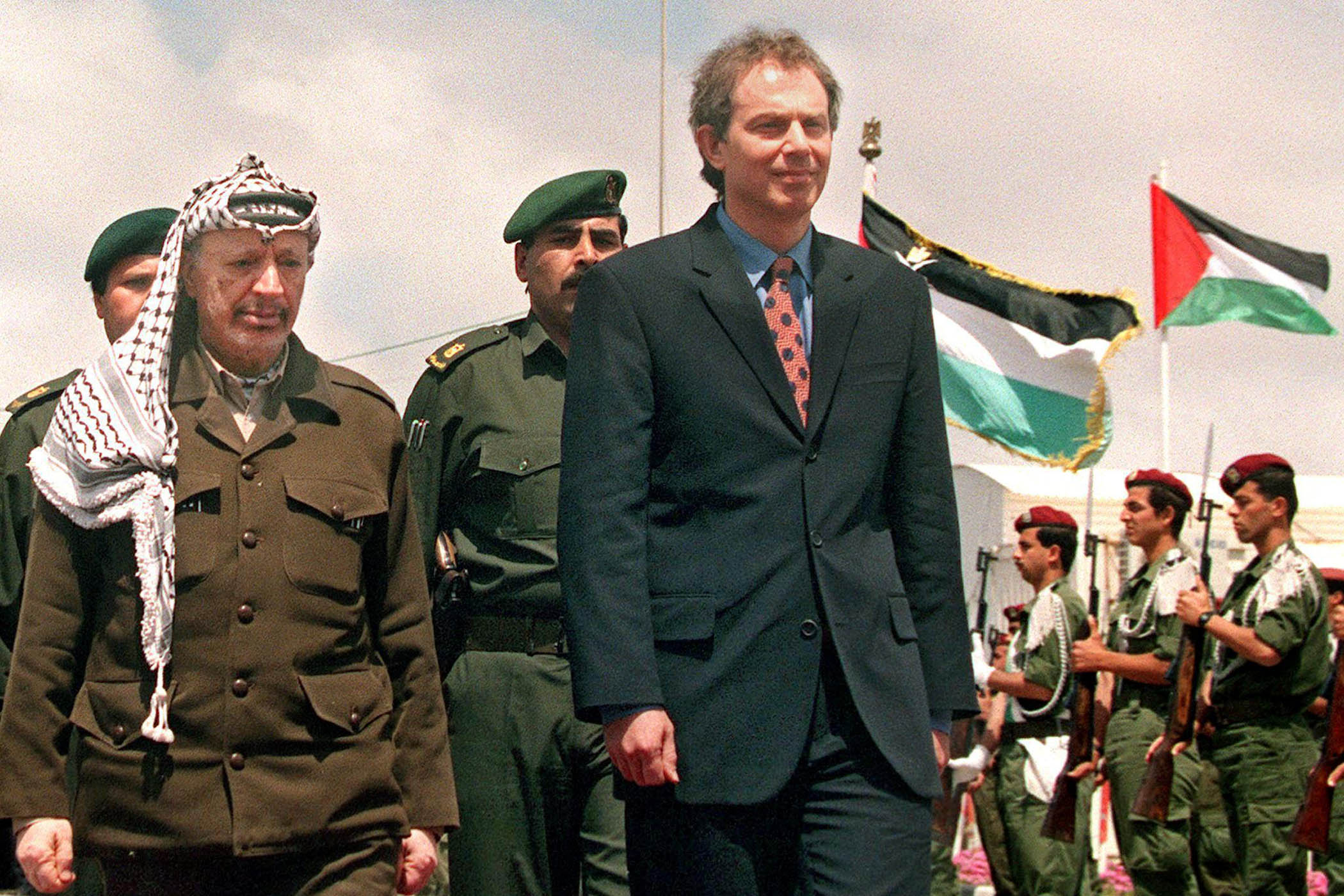
With Palestinian leader Yasser Arafat in Gaza, 1998
“They’re the only show in town. You’ve got to work with those who can achieve something.”
The former prime minister has always liked the idea that he can fix problems nobody else can. Sir David Manning, who was Blair’s foreign policy adviser in Number 10, says he had seen in Northern Ireland that an “intractable issue” turned out to be “tractable” in the end. “He was absolutely committed to the idea that the Middle East problem was solvable and must be solved,” he says. The other impulse came from 9/11. “He saw [the Israel-Palestine problem] as one of the drivers of fundamentalism and radicalisation that desperately needed to be tackled.”
Sir Anthony Seldon, the political historian who has written biographies of many prime ministers including Blair, says the Middle East is “deeply personal” for him. “I think it comes from his faith and a sense of wanting to see himself as a healer. As prime minister, he wanted the big tent, he wanted to be inclusive – he didn’t want to be a tribal divisive leader, that sense of wanting to build bridges and to unify, and to have the bravery to go into places other people wouldn’t want to go, is very important to him.”
The former senior diplomat Sir John Jenkins, who held a range of ambassadorial posts around the Middle East, thinks “there’s a lot of unfinished business” for Blair in the region. “It’s business that’s unfinished because it can never be finished,” he says. “I wouldn’t say messianic, but there is this eternal optimism about him which, given the absence of optimism in most of our political class since then, is not necessarily a bad thing. When it comes to the Middle East it may prove to be the triumph of hope over experience.”
At 72, Blair has nothing to lose. He is too old to be bullied or cajoled by Trump but he also knows it is only the president who has the power to make the peace plan stick.
When Labour MPs ask how he can work with the Republican leader he says he is beyond partisan politics these days. “If we can end the war, we will have done something good.”
Photograph by David Furst/AFP via Getty; Gali Tibbon/AFP via Getty; Ilia Yefimovich/Getty; Fayez Nureldine/AFP


